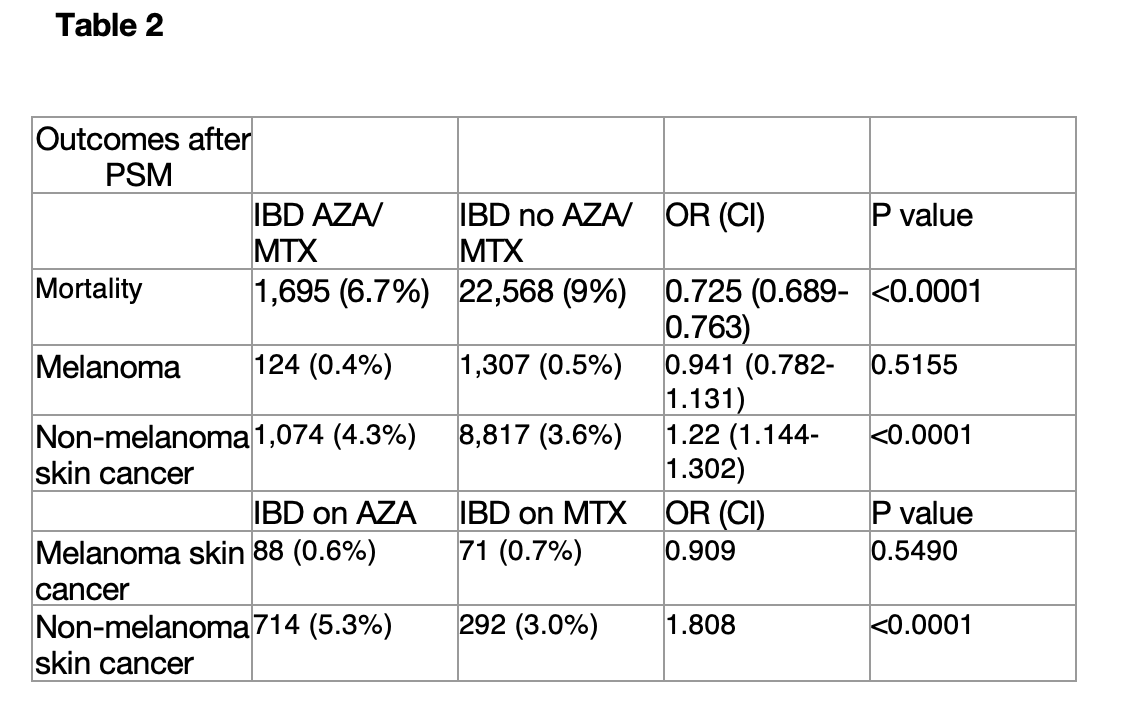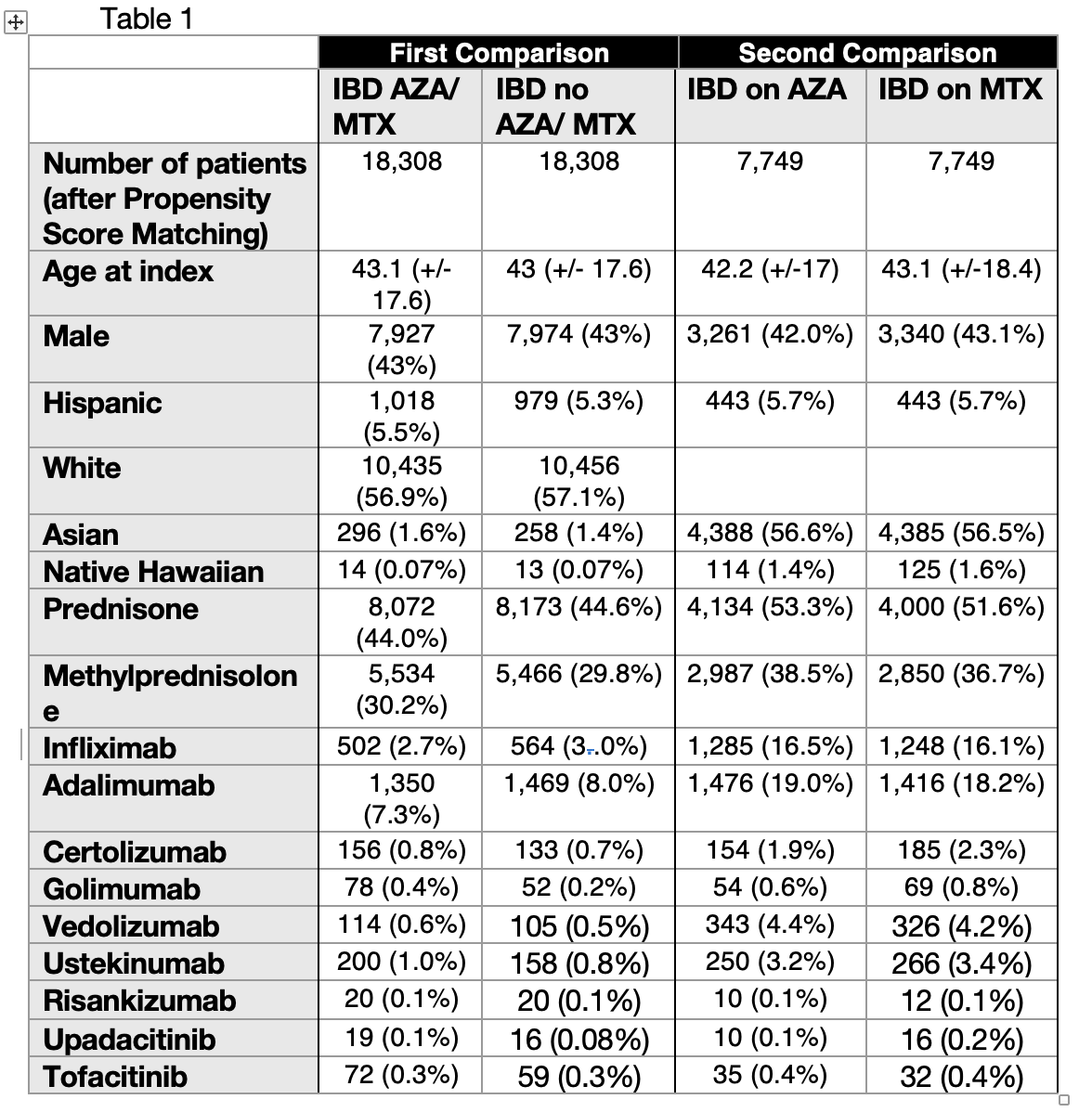Monday Poster Session
Category: IBD
P3286 - Assessing the Outcomes of AZA and MTX Use on Mortality and Skin Cancer Development in Patients With IBD
Monday, October 27, 2025
10:30 AM - 4:00 PM PDT
Location: Exhibit Hall

M Housam Nanah, MD
Cleveland Clinic
Cleveland, OH
Presenting Author(s)
M Housam Nanah, MD1, Varun Aitharaju, MD2, Ahmed Telbany, MD3, Joseph Sleiman, MD2
1Cleveland Clinic, Cleveland, OH; 2Cleveland Clinic Foundation, Cleveland, OH; 3University of New Mexico, Albuquerque, NM
Introduction: Inflammatory bowel disease (IBD), has been linked with both melanoma and nonmelanoma skin cancers, particularly through the use of an immunosuppressant agent (IMM), azathioprine (AZA), with or without biologics. Many consider methotrexate (MTX) as an alternative, safer, immunosuppressive agent for combination therapy. However, some evidence in non-IBD autoimmune disorders suggests a similar skin cancer risk. This study investigates the relationship between AZA or MTX use and the incidence of melanoma, non melanoma skin cancers, and all-cause mortality in the IBD patient population.
Methods: In this retrospective cross-sectional TriNetX database study, adult patients with ulcerative colitis (UC) and Crohn’s disease (CD) were identified using ICD-10 codes, and 4 cohorts were established: Patients with IBD on either MTX or AZA (IBD+IMM), those with no exposure to MTX or AZA (IBD-IMM), IBD patients with IBD only AZA exposure (IBD+AZA), and those with only MTX exposure (IBD+MTX). Propensity score matching (PSM) was performed based on baseline demographics, age, sex, and use of advanced IBD therapies.
Results: PSM yielded 18,308 patients in both groups of IBD+IMM and IBD-IMM. Similarly, 7,749 patients were identified for comparing groups of IBD+AZA and IBD+MTX.
Following PSM, IBD+IMM had lower odds of mortality (OR 0.725) and higher odds of nonmelanoma skin cancer (OR 1.22) compared to patients of IBD-IMM. IBD+AZA group had lower odds of mortality (OR 0.865) with higher odds of nonmelanoma skin cancer (OR 1.808) compared to patients with IBD+ MTX. There was no difference in terms of Melanoma skin cancer between either two groups.
Discussion: In this large, real-world cross-sectional study, the use of IMMs in patients with IBD was associated with lower mortality odds at the risk of an increased risk of developing nonmelanoma skin cancer. Analysis comparing AZA to MTX showed similar findings with increased risk for developing nonmelanoma skin cancer in the AZA group, with no signal against either agent for melanoma. This might portray the balance between the benefits of disease control and IMM risk.

Figure: Baseline characteristics after PSM

Figure: Outcomes after PSM
Disclosures:
M Housam Nanah indicated no relevant financial relationships.
Varun Aitharaju indicated no relevant financial relationships.
Ahmed Telbany indicated no relevant financial relationships.
Joseph Sleiman indicated no relevant financial relationships.
M Housam Nanah, MD1, Varun Aitharaju, MD2, Ahmed Telbany, MD3, Joseph Sleiman, MD2. P3286 - Assessing the Outcomes of AZA and MTX Use on Mortality and Skin Cancer Development in Patients With IBD, ACG 2025 Annual Scientific Meeting Abstracts. Phoenix, AZ: American College of Gastroenterology.
1Cleveland Clinic, Cleveland, OH; 2Cleveland Clinic Foundation, Cleveland, OH; 3University of New Mexico, Albuquerque, NM
Introduction: Inflammatory bowel disease (IBD), has been linked with both melanoma and nonmelanoma skin cancers, particularly through the use of an immunosuppressant agent (IMM), azathioprine (AZA), with or without biologics. Many consider methotrexate (MTX) as an alternative, safer, immunosuppressive agent for combination therapy. However, some evidence in non-IBD autoimmune disorders suggests a similar skin cancer risk. This study investigates the relationship between AZA or MTX use and the incidence of melanoma, non melanoma skin cancers, and all-cause mortality in the IBD patient population.
Methods: In this retrospective cross-sectional TriNetX database study, adult patients with ulcerative colitis (UC) and Crohn’s disease (CD) were identified using ICD-10 codes, and 4 cohorts were established: Patients with IBD on either MTX or AZA (IBD+IMM), those with no exposure to MTX or AZA (IBD-IMM), IBD patients with IBD only AZA exposure (IBD+AZA), and those with only MTX exposure (IBD+MTX). Propensity score matching (PSM) was performed based on baseline demographics, age, sex, and use of advanced IBD therapies.
Results: PSM yielded 18,308 patients in both groups of IBD+IMM and IBD-IMM. Similarly, 7,749 patients were identified for comparing groups of IBD+AZA and IBD+MTX.
Following PSM, IBD+IMM had lower odds of mortality (OR 0.725) and higher odds of nonmelanoma skin cancer (OR 1.22) compared to patients of IBD-IMM. IBD+AZA group had lower odds of mortality (OR 0.865) with higher odds of nonmelanoma skin cancer (OR 1.808) compared to patients with IBD+ MTX. There was no difference in terms of Melanoma skin cancer between either two groups.
Discussion: In this large, real-world cross-sectional study, the use of IMMs in patients with IBD was associated with lower mortality odds at the risk of an increased risk of developing nonmelanoma skin cancer. Analysis comparing AZA to MTX showed similar findings with increased risk for developing nonmelanoma skin cancer in the AZA group, with no signal against either agent for melanoma. This might portray the balance between the benefits of disease control and IMM risk.

Figure: Baseline characteristics after PSM

Figure: Outcomes after PSM
Disclosures:
M Housam Nanah indicated no relevant financial relationships.
Varun Aitharaju indicated no relevant financial relationships.
Ahmed Telbany indicated no relevant financial relationships.
Joseph Sleiman indicated no relevant financial relationships.
M Housam Nanah, MD1, Varun Aitharaju, MD2, Ahmed Telbany, MD3, Joseph Sleiman, MD2. P3286 - Assessing the Outcomes of AZA and MTX Use on Mortality and Skin Cancer Development in Patients With IBD, ACG 2025 Annual Scientific Meeting Abstracts. Phoenix, AZ: American College of Gastroenterology.
